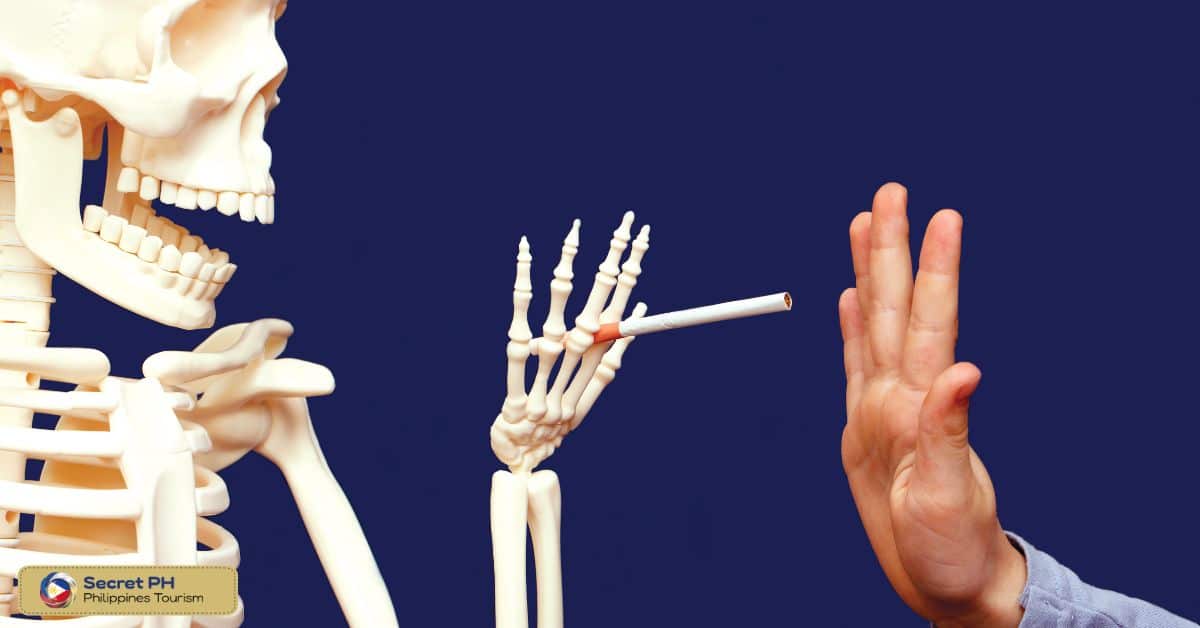Living a healthy lifestyle is essential to maintaining physical and mental well-being. It can be difficult to make long-term changes, especially when there are so many unhealthy options available in our modern world.
Our wellness center in the Philippines has compiled seven tips for achieving a healthy lifestyle. These tips include eating a balanced diet, staying active, getting enough sleep, managing stress, staying hydrated, avoiding harmful substances, and building a strong support system. By incorporating these habits into your daily routine, you can achieve optimal health and well-being.
In this guide, we’ll cover the 7 most important steps to establishing a healthy lifestyle, as well as helpful resources for anyone who needs additional support. Read on to learn how you can become the best version of yourself!

Tip #1: Eating a Balanced and Nutritious Diet
Eating a balanced and nutritious diet is crucial for maintaining good health and well-being. In fact, it is often said that you are what you eat. The food you consume not only affects your physical health but also your mental health and cognitive abilities.
To ensure that you are eating a balanced and nutritious diet, try incorporating a variety of foods from different food groups. Avoid consuming highly-processed foods that are often high in sugar, unhealthy fats, and salt. Instead, opt for whole, natural foods that are minimally processed.
Foods to Include in Your Diet:
- Fruits- An excellent source of vitamins, minerals, and antioxidants that help strengthen your immune system. They are low in calories and high in fiber which aids digestion.
- Vegetables- Rich in vitamins, minerals, and dietary fiber that help maintain good health. Different types of vegetables provide different nutrients. Therefore, it is advisable to eat a variety of vegetables to obtain a broad range of essential nutrients.
- Grains- These provide carbohydrates that are essential for energy production. Whole grains such as whole-wheat bread, brown rice, and oatmeal are rich in fiber and other essential nutrients.
- Dairy- Contains high amounts of calcium which is essential for strong bones and teeth. Low-fat or fat-free versions of milk, cheese, and yogurt are excellent sources of dairy.
- Protein- Necessary for muscle building and repair. Foods like meat, poultry, fish, eggs, nuts, and legumes are great sources of protein.

Tip #2: Staying Active and Engaging in Regular Exercise
Staying active and engaging in regular exercise are essential to a healthy lifestyle. It’s not just about maintaining a good physique, but it’s also about keeping your body and mind in shape.
Regular exercise helps to improve cardiovascular health, reduce stress and anxiety levels, boost immunity, and increase overall energy levels. It can also help to prevent a variety of chronic diseases such as obesity, diabetes, and heart disease.
Staying active and engaging in regular exercise don’t have to be a chore. It can be a fun and enjoyable activity that you look forward to each day. Take the time to explore different types of exercise and find something that you love. Your body and mind will thank you for it.
Types of Exercise You May Engage In:
- Cardio exercises- Walking, jogging, running, biking, swimming, jumping rope
- Strength-training exercises- Weightlifting, bodyweight exercises (push-ups, squats), kettlebells
- High-intensity interval training (HIIT)- Alternating periods of intense exercise and rest
- Stretching and flexibility exercises- Yoga, Pilates, foam rolling
- Balance and agility exercises- Tai-chi, dance classes

Tip #3: Getting Enough Sleep and Managing Stress
Getting adequate sleep and managing stress are two essential aspects of leading a healthy and happy life. It can be challenging to manage these two factors, given the hectic lifestyles we lead today. And yet, it is crucial to make a conscious effort to prioritize getting enough sleep and managing stress, as it can have a significant impact on our physical and mental health.
Managing stress is also essential for our overall well-being. Stress is a normal response to challenging situations, but when it becomes chronic, it can lead to physical and mental health problems such as high blood pressure, headaches, anxiety, and depression. To manage stress effectively, it is crucial to identify the triggers that cause stress and find ways to minimize or eliminate them.
How to Get Enough Sleep:
• Establish a consistent sleep schedule – aim to go to bed and wake up at the same time each day
• Avoid caffeine and stimulants late in the day
• Establish a bedtime routine – take a warm bath, read a book, or practice light stretches to help your body relax and prepare for sleep
• Reduce blue light exposure by avoiding screens an hour before bed
• Create a comfortable sleeping environment – keep the room cool, dark, and quiet.
How to Manage Stress:
• Make time for self-care activities such as taking a walk in nature, journaling, yoga, or meditation
• Establish healthy boundaries with family and friends – ask for help when you need it and take time for yourself
• Practice deep breathing techniques to facilitate relaxation and focus
• Connect with a community of support – join a class or group that can provide social connection and help keep stress levels in check.
• Talk to a mental health professional – if stress becomes chronic or affects your day-to-day life, seek support from a licensed therapist.

Tip #4: Staying Hydrated and Limiting Alcohol and Caffeine
Staying hydrated is essential to keeping your body functioning properly. It’s especially important during hot weather, after exercise, and when you’re feeling sick. Drinking plenty of water throughout the day can help you prevent dehydration and keep your body functioning at its best.
In addition to staying properly hydrated, it’s also important to limit your intake of alcohol and caffeine. While both can be enjoyable, they can also cause dehydration and disrupt your natural sleep patterns. Too much alcohol can also damage your liver and other organs over time.
If you want to stay healthy and feel your best, be sure to drink plenty of water and limit your intake of alcohol and caffeine. You might be surprised by how much better you feel when you’re properly hydrated and not relying on stimulants to get you through the day. So go ahead and reach for that glass of water – your body will thank you for it!
Tips for Staying Hydrated:
• Carry a reusable water bottle with you throughout the day
• Eat plenty of fresh fruits and vegetables that have high water content (such as cucumbers and melons)
• Limit your intake of caffeinated and alcoholic beverages
• Include electrolyte-rich drinks such as coconut water or sports drinks in your diet
• Monitor the amount of water you’re drinking throughout the day to ensure that you’re staying hydrated.
Tips for Limiting Alcohol:
• Set limits for yourself and stick to them – decide beforehand how many drinks you will have in an evening or week and make sure to adhere to it
• Opt for non-alcoholic beverages – such as sparkling water, herbal tea, or kombucha
• Choose light beer or wine when consuming alcohol – this will help you limit your intake
• Eat before and while drinking – food helps slow the absorption of alcohol into the bloodstream
• Have a designated driver or use public transportation
Tips for Limiting Caffeine:
• Avoid energy drinks – these often contain large amounts of caffeine as well as other stimulants which can be detrimental to your health
• Switch out coffee for green tea or other herbal teas – these are lower in caffeine and contain other beneficial compounds
• Avoid consuming caffeine late in the day – this can negatively affect sleep quality
• Drink plenty of water throughout the day – staying hydrated will help reduce cravings for caffeinated beverages.

Tip #5: Avoiding Smoking and Other Harmful Substances
Smoking and using other harmful substances can have serious health consequences. Smoking is one of the most dangerous habits, leading to various health issues such as lung cancer, heart disease, COPD (chronic obstructive pulmonary disease), stroke, and numerous other conditions.
Several substances – including alcohol, drugs, and prescription medication – can have serious health consequences when misused or abused. Not only do these substances increase your risk of various illnesses, but they can also lead to addiction, making it more difficult to maintain a healthy lifestyle.
How to Avoid Smoking and Other Harmful Substances:
• Know the risks of smoking and other substances – be aware of the potential health consequences of using them
• Avoid tempting situations – if you are in an environment where there is smoking or other substances, try to remove yourself from it
• Seek help – if you or a loved one are struggling with addiction or substance abuse, seek professional help. There are many resources out there to provide support and assistance
• Have a strong social network – having friends who can offer emotional and practical support can be invaluable in helping you stay away from harmful substances.

Tip #6: Regular Health Check-Ups and Screening Tests
Regular health check-ups and screening tests are essential for maintaining good health and detecting potential health problems at an early stage. This is why Tip #6 in our health and wellness series is all about the importance of staying up to date with your check-ups and tests.
Health check-ups typically involve a variety of tests and exams designed to evaluate your overall health and identify any potential issues. Examples of these tests might include blood pressure checks, cholesterol screenings, diabetes screenings, and body mass index (BMI) measurements. Depending on your age, gender, and health history, your doctor may recommend additional tests or screenings as well.
Screening tests are similar to check-ups in that they’re designed to detect potential health problems early on. However, screening tests are typically used to evaluate specific health conditions or risks. For example, a mammogram might be used to screen for breast cancer in women, while a colonoscopy might be used to screen for colorectal cancer in both men and women.
If you’re unsure about which tests or screenings are recommended for your age and health history, don’t hesitate to talk to your doctor. They can provide guidance on which tests you should be getting and when.

Tip #7: Building Strong Social Connections and a Support System
Building strong social connections is essential for our overall well-being, happiness, and success. Having a support system is crucial, especially in difficult times when we need someone to turn to. Here are some tips to help build strong social connections and a support system:
- Networking– Networking is a great way to meet new people who share your interests or goals. Attend local events, conferences, and seminars in your field to meet like-minded people. Joining clubs and organizations is also a great way to connect with people who have similar interests.
- Volunteering– Volunteering is a fantastic way to not only give back to your community but also to meet new people. Volunteering in your community enables you to connect with new people who are passionate about the same causes as you.
- Social media– Social media platforms provide endless opportunities to connect with people from all over the world. Use social media platforms like Facebook, Twitter, and LinkedIn to connect with people in your industry or with similar interests.
- Join in on activities– Participate in community activities, events, and activities that interest you. This will allow you to connect with new people and build relationships over shared interests.
- Stay in touch with old friends– Reconnect with old friends, family, and acquaintances. Reach out to them via phone or email, and plan activities to catch up in person.
- Be friendly and approachable– Be open, courteous, and approachable to new people you meet. Everyone has something to offer and treating everyone with respect and kindness can lead to new friendships and connections.

In conclusion
Living a healthy and happy life involves taking small steps each day to nurture your physical and mental health. These steps may include regular exercise, getting enough sleep, staying hydrated, and limiting alcohol and caffeine intake.
Additionally, avoiding smoking and other harmful substances, keeping up with regular health check-ups and screening tests, as well as building strong social connections and a support system. Everyone’s journey to health and wellness is unique, so go at your own pace and find what works best for you. With dedication and discipline, you will be well on your way to living a healthy and fulfilling life.








